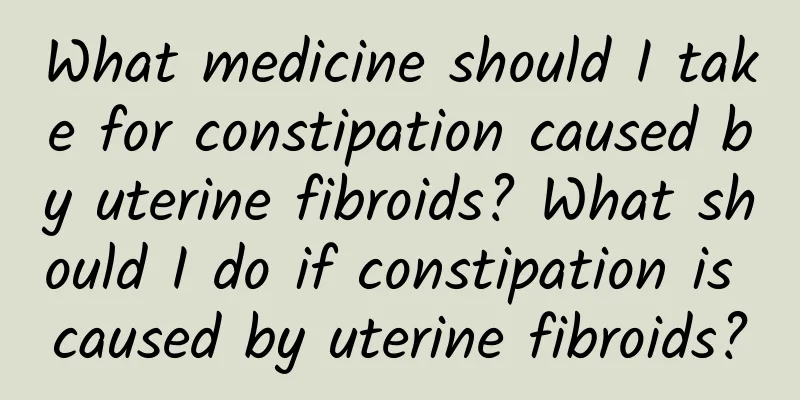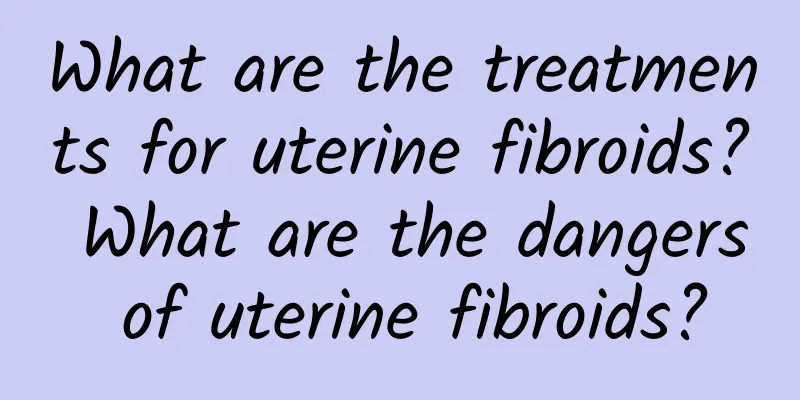What medicine should I take for constipation caused by uterine fibroids? What should I do if constipation is caused by uterine fibroids?

|
Uterine fibroids are benign tumors that occur in the uterine muscle layer. They are often accompanied by a series of symptoms, such as back pain and constipation. These symptoms are distressing to patients, so patients often want to know what medicine they should take to relieve these symptoms. 1. Uterine fibroids and back pain Uterine fibroids can cause back pain in patients. Back pain often has a significant impact on the patient's quality of life. For back pain, patients are advised to try some over-the-counter medications such as ibuprofen or paracetamol. These medications can relieve pain and reduce inflammation. 2. Uterine fibroids and constipation Uterine fibroids may cause constipation because the growth of fibroids will compress the intestines, causing intestinal peristalsis to slow down. For constipation problems, patients are advised to change their lifestyle first. Increase the intake of dietary fiber, such as vegetables, fruits, and whole grains. In addition, patients can also consider taking some laxatives, such as sodium maltobionic acid or rhubarb. 3. What medicine should I take for lower back pain and constipation caused by uterine fibroids? For back pain and constipation caused by uterine fibroids, drug treatment is not the only option. In addition to the over-the-counter drugs such as ibuprofen and paracetamol mentioned above, patients can also consider Chinese medicine treatment. Chinese medicine has a certain effect on regulating uterine function and improving constipation. Commonly used Chinese medicines include Wuji Baifeng Pills, Chuanxiong Tea, Angelica, Lycium barbarum, etc. However, when choosing Chinese medicine treatment, it is best to consult a professional Chinese medicine practitioner for advice. In summary, uterine fibroids are often accompanied by symptoms such as back pain and constipation, but patients do not necessarily need to rely on medication to relieve these symptoms. Changing lifestyle habits, increasing dietary fiber intake, and using over-the-counter drugs and Chinese medicine appropriately are all ways to help patients relieve back pain and constipation problems. However, the most important thing is to consult a doctor in a timely manner when encountering these problems in order to develop a personalized treatment plan. |
>>: What can I eat to repair uterine fibroids faster? What can I eat to improve uterine fibroids?
Recommend
What medicine should Gongyanping be used with to treat uterine fibroids? How does Gongyanping dripping pill treat uterine fibroids?
What medicine should Gongyanping be used with to ...
Dysmenorrhea one week before menstruation
Dysmenorrhea one week before menstruation is usua...
What are the causes of congenital absence of vagina?
Congenital absence of vagina is a relatively seri...
Is the right ovarian cyst benign and serious? What are the consequences?
What are the consequences of a serious benign rig...
Is it normal to have a period every 35 days?
A 35-day menstrual cycle is generally considered ...
What is the difference between painless abortion and abortion
Abortion generally refers to artificial abortion,...
It’s not your fault that you’re greedy! Your gluttony may be caused by bad intestinal bacteria "dirty fat bacteria"
Traditional Chinese medicine believes that if you...
Irregular menstruation in women is related to occupation
Generally speaking, we analyze the causes of irre...
Survey: It is better to choose breakfast restaurants with vegetable menus and sugar-free drinks
Have you had breakfast today? How do you eat brea...
What are the characteristics of irregular menstruation?
What are the characteristics of irregular menstru...
What harm does irregular menstruation bring?
What harm does irregular menstruation bring? Many...
Husbands should also pay attention to some symptoms of ectopic pregnancy in pregnant women
Ectopic pregnancy is not only harmful to pregnant...
Beijing Gynecological Hospital
A healthy body is the capital of revolution, espe...
95% of milk powder emphasizes nutritional fortification; excessive intake may cause illness
There are a wide variety of milk and milk powder ...
What is the cause of half-month menstruation?
What is the cause of half-month menstruation? Hal...









